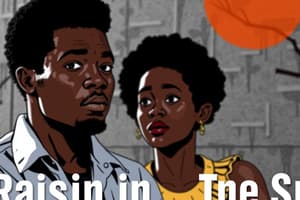Podcast
Questions and Answers
What does the opening description of the Younger family's apartment say about them?
What does the opening description of the Younger family's apartment say about them?
Even though the apartment is old, the Younger family tries to keep it neat and repaired, which shows they will try to work with whatever they have.
What do we know about each of the characters so far? How do they differ?
What do we know about each of the characters so far? How do they differ?
Beneatha wants to try everything, is spontaneous and experimental. Walter wants to make money as quickly as possible. Mama is the matriarch and is extremely religious. Ruth is stern and conservative with money. Travis is Ruth and Walter's son and is an entrepreneur. He is babied by everyone.
How would you describe Walter and Ruth's relationship so far? What circumstances impact their relationship?
How would you describe Walter and Ruth's relationship so far? What circumstances impact their relationship?
They often banter and tease. They disagree over issues involving money and how to raise Travis.
What significance does the check hold for the family?
What significance does the check hold for the family?
Should Walter be entitled to some of the insurance money?
Should Walter be entitled to some of the insurance money?
Who is the decision maker in the family so far?
Who is the decision maker in the family so far?
What is Beneatha's attitude towards God? Why is her attitude significant?
What is Beneatha's attitude towards God? Why is her attitude significant?
Why does Beneatha say she won't marry George?
Why does Beneatha say she won't marry George?
What do you make of Ruth's statement: 'Shallow? What do you mean [George is] shallow? He's RICH!'?
What do you make of Ruth's statement: 'Shallow? What do you mean [George is] shallow? He's RICH!'?
Explain the significance of Ruth saying, 'Eat your eggs, they gonna be cold.'
Explain the significance of Ruth saying, 'Eat your eggs, they gonna be cold.'
During what day of the week does Scene 2 take place? Why is this significant?
During what day of the week does Scene 2 take place? Why is this significant?
What does Beneatha mean by saying that her family is suffering from 'acute ghetto-itis'?
What does Beneatha mean by saying that her family is suffering from 'acute ghetto-itis'?
What does Alaiyo mean?
What does Alaiyo mean?
Why is Asagai's nickname for Beneatha appropriate?
Why is Asagai's nickname for Beneatha appropriate?
What does Joseph bring for Beneatha? Why are they significant?
What does Joseph bring for Beneatha? Why are they significant?
What does Joseph Asagai say about Beneatha's hair? Why?
What does Joseph Asagai say about Beneatha's hair? Why?
Who in the Younger family might be considered an assimilationist? Why?
Who in the Younger family might be considered an assimilationist? Why?
What impact does the arrival of the check have on Walter?
What impact does the arrival of the check have on Walter?
Was Walter's behavior justified towards the end of Scene 2?
Was Walter's behavior justified towards the end of Scene 2?
What's eating Walter?
What's eating Walter?
Why does Mama tell Walter, 'You are a disgrace to your father's memory'?
Why does Mama tell Walter, 'You are a disgrace to your father's memory'?
What connections can be made between Walter and Prometheus?
What connections can be made between Walter and Prometheus?
Why is it significant that George enters while Walter and Beneatha enact African characters?
Why is it significant that George enters while Walter and Beneatha enact African characters?
How are Walter and George different?
How are Walter and George different?
How does George respond to Walter's desire to talk 'plans'?
How does George respond to Walter's desire to talk 'plans'?
Why does Walter say, 'Bitter? Man, I'm a volcano. Bitter? Here I am a giant—surrounded by ants!'?
Why does Walter say, 'Bitter? Man, I'm a volcano. Bitter? Here I am a giant—surrounded by ants!'?
Why does George call Walter 'Prometheus'?
Why does George call Walter 'Prometheus'?
Which character(s) have challenged the stereotype that African Americans 'don't know how to do nothing but moan, pray and have babies'?
Which character(s) have challenged the stereotype that African Americans 'don't know how to do nothing but moan, pray and have babies'?
Is it fair for Walter to say that Mama 'butchered' his dream?
Is it fair for Walter to say that Mama 'butchered' his dream?
What does George mean by wanting a 'simple...sophisticated girl'? How is it ironic?
What does George mean by wanting a 'simple...sophisticated girl'? How is it ironic?
How do George and Beneatha's views about education differ?
How do George and Beneatha's views about education differ?
What offensive remarks does Mrs. Johnson make?
What offensive remarks does Mrs. Johnson make?
Why did Hansberry include Mrs. Johnson in the play?
Why did Hansberry include Mrs. Johnson in the play?
Where has Walter been for the past few days?
Where has Walter been for the past few days?
How is Mama going to divvy up the money? Explain.
How is Mama going to divvy up the money? Explain.
What can we surmise about Walter's behavior as he tucks Travis in?
What can we surmise about Walter's behavior as he tucks Travis in?
How does Ruth and Walter's relationship change as the play progresses?
How does Ruth and Walter's relationship change as the play progresses?
What does Walter mean by, 'Damn, even the NAACP takes a holiday sometimes!'?
What does Walter mean by, 'Damn, even the NAACP takes a holiday sometimes!'?
How is the 'Welcoming Committee' ironic?
How is the 'Welcoming Committee' ironic?
What is Mr. Lindner doing by saying that African American families are happiest living in their own communities?
What is Mr. Lindner doing by saying that African American families are happiest living in their own communities?
How does the Younger family cope with Mr. Lindner's troubling visit?
How does the Younger family cope with Mr. Lindner's troubling visit?
What does it mean when Mama says her plant 'expresses me'?
What does it mean when Mama says her plant 'expresses me'?
What is the last word in Act 2, and why is it significant?
What is the last word in Act 2, and why is it significant?
How do Asagai's and Beneatha's views of the future differ at the beginning of the act?
How do Asagai's and Beneatha's views of the future differ at the beginning of the act?
How does Mama change after Walter loses the money?
How does Mama change after Walter loses the money?
What was Mama referring to when she tells Walter, 'We ain't never been that dead inside'?
What was Mama referring to when she tells Walter, 'We ain't never been that dead inside'?
Do you agree with Mama when she says 'the time to love somebody the most...is when he's at his lowest'?
Do you agree with Mama when she says 'the time to love somebody the most...is when he's at his lowest'?
What point was Walter trying to make when he told Lindner, 'My father almost beat a man to death because he called him a bad name or something, you know what I mean?'
What point was Walter trying to make when he told Lindner, 'My father almost beat a man to death because he called him a bad name or something, you know what I mean?'
How does Mama respond when Mr. Lindner appeals to her after Walter tells him they decided to move into the house? Why is it significant?
How does Mama respond when Mr. Lindner appeals to her after Walter tells him they decided to move into the house? Why is it significant?
In what ways is Walter a 'rainbow after the rain'?
In what ways is Walter a 'rainbow after the rain'?
Flashcards are hidden until you start studying
Study Notes
Younger Family Dynamics
- The Younger family's apartment is old but maintained, symbolizing their resilience and determination.
- Each character exhibits distinct aspirations: Beneatha is experimental and adventurous, Walter is financially driven, Mama is traditional and religious, Ruth is pragmatic, and Travis is idealistically entrepreneurial.
Walter and Ruth’s Relationship
- Their relationship is marked by playful banter and disagreements over financial decisions and parenting styles.
- The couple's challenges underscore the stress of financial insecurity and differing values regarding responsibility and dreams.
Significance of the Insurance Check
- The check represents hope and the potential for change, but also contention due to differing views on its usage.
- It acts as a pivotal point for family unity or discord, revealing personal desires and aspirations.
Conflict Over Money
- Walter feels entitled to a share of the insurance money, reflecting tension over familial roles and responsibilities.
- Mama is viewed as the primary decision-maker, having authority over family finances and legacy.
Beneatha’s Views and Identity
- Beneatha’s skepticism towards God indicates a generational shift in beliefs, valuing hard work over faith for success.
- She refuses to marry George, whom she sees as superficial, prioritizing her dreams in medicine over wealth.
Nature of the Younger Family’s Challenges
- Ruth's assertion to "Eat your eggs" symbolizes the conflict between practicality and aspiration, illustrating the daily struggles they face.
- Beneatha's term "acute ghetto-itis" critiques their living conditions and reflects a desire for a better life.
Cultural Identity
- Joseph Asagai's gifts to Beneatha signify cultural pride and a connection to African heritage.
- Asagai’s critique of Beneatha’s hair represents themes of identity and assimilation in the African American experience.
Walter's Aspirations and Struggles
- Walter’s frustration with his economic situation drives him to become increasingly agitated as he feels dismissed by his family.
- Asagai believes in Beneatha’s potential, contrasting his optimistic vision with her temporary defeatism.
Themes of Pride and Identity
- Walter’s anger and dreams juxtapose against societal expectations, revealing a struggle for dignity and respect as an African American man.
- The family's consideration of moving into a white neighborhood highlights the systemic racism they confront, as articulated by Mr. Lindner's patronizing comments.
Transformation and Hope
- Walter’s journey reflects a quest for self-worth, which culminates in a moment of familial pride when he stands up to Mr. Lindner.
- The final act symbolizes a rebirth for Walter, who emerges not just in terms of material wealth but through self-acceptance and family unity.
Overall Character Development
- Mama’s evolving hopes after Walter’s misstep showcase familial relationships built on love and resilience, emphasizing that family should stick together during crises.
- The ending echoes themes of resilience, suggesting that despite adversity, hope and familial love can lead to renewal and happiness.
Studying That Suits You
Use AI to generate personalized quizzes and flashcards to suit your learning preferences.




